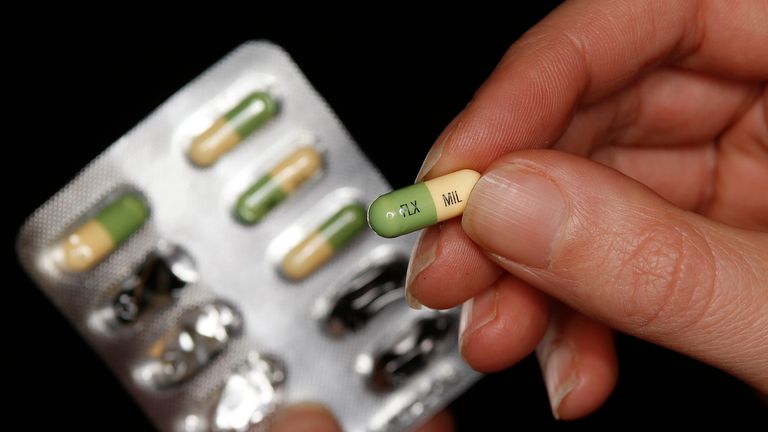'I was in absolute hell': The effect of coming off antidepressants
Oliver Harrison says he had to go to A&E twice after coming off his medication and "couldn't stop crying".
Tuesday 9 April 2019 13:27, UK
Reverend Oliver Harrison has been a long-term user of antidepressants - but when he came off the medication, it caused "horrendous" side effects.
Leading medical experts are warning that using Selective serotonin reuptake inhibitors (SSRI) drugs for long periods of time could be doing permanent damage to patient's bodies.
Mr Harrison, from Tamworth in Staffordshire, told Sky News what happened when he tried to stop his medication.
I started on antidepressants around 20 years ago.
I'd been having a difficult time at work but I think I've always been prone to low mood and anxiety.
My doctor prescribed antidepressants and they made an enormous difference fairly quickly.
It's worth saying that SSRI drugs are a fantastic class of medication: cheap, efficacious and relatively safe.
In an overstretched NHS, it's easy to see why they are the first line of treatment.
But like anything that's too good to be true there's a downside - a dark side - and that comes at the other end of process, when it's time to reduce or come off the medication.
I stopped taking my medication 10 years ago but I did it completely the wrong way; it was haphazard, chaotic - and extremely unpleasant.
I was in a new job and life was good. I'd been missing doses of the medication and I felt like I needed the tablets less and less.
I went away to a conference for week and forgot to pack my medication. I didn't miss it and I didn't start taking it again when I got home.
It was unplanned and certainly not thought through.
A few days later the symptoms I started getting were horrendous.
I've never been so ill in my life, both physically and mentally. It was just appalling.
Something felt badly wrong with me. I went to A&E on two occasions. I had nausea, vertigo, insomnia, muscle cramps, mood swings, panic attacks and I couldn't stop crying.
At first I didn't know what was wrong with me; I didn't connect it with stopping the medication.
I now know this is called "SSRI Discontinuation Syndrome".
For the best part of three months, I was in absolute hell and it was unbelievably bad.
It was only when I restarted the medication again - a different one this time - that all of those symptoms began to clear up within a few days.
For some people, coming off antidepressants isn't a problem. But there are three reasons why it can be.
The first is the length of time someone has been on the medication. The longer the course of treatment, the harder it can be to come off.
It seems that the brain and central nervous system adjust around the drug.
More and more people are taking these drugs and many are staying on them for years. So this is an issue that is only going to get bigger.
The second problem is that the modern medications have a much shorter "half-life" - the time it takes to metabolise half the amount taken.
In layman's terms, this means it doesn't stay in your system for very long. This makes it hard to miss a dose and not feel it very quickly.
It also makes tapering harder; the antidepressants don't hang around long enough in your system to smooth over each step down in dose.
The third factor is the dose itself: the higher it is, the further you've got further to come down. All three factors applied to me.
Nowadays there's much greater understanding that in order to come off, you can't just do it by reducing your dose to half, then a quarter and then simply stop.
It needs to be a very slow taper, reducing the amount by tiny increments over months - not weeks. That's very difficult with tablets.
For example, my own medication comes in 20mg, 10mg and 5mg pills.
The one thing I think that would help people in my position is if pharmaceutical companies would make tablets available in much smaller increments.
Having tablets in 1mg and 0.25mg would allow people to readily tailor-make their own dose, so it'd be easier to create a slow, steady, smooth withdrawal.
There are two current options available for people wanting to fine-tune their tapering regimes: first, many of these drugs are available in liquid form which can then be further diluted.
But this is messy and complicated and quite imprecise.
Secondly, and better, the University of Maastricht offers a brilliant scheme called "Tapering Strips" which produces daily doses of tablets in pre-packaged weekly strips, each one at a very slightly lower dose.
This is tailor-made and patient-led, so individual users can slow or stop the rate of reduction as they want or need to. I would like that to be more widely accessed.
My experience has made me scared to try reducing my dose again.
I would like to work towards coming off of the drugs or at least seeing if I could get by with less.
It's only one pill once a day - it's not like I'm injecting insulin or having kidney dialysis. It's only a small thing but it's not something I'm free from.
The NICE guidelines on withdrawing from antidepressants is being reviewed and now seems a good time to speak out, collect data, report problems and lobby the government.
For anyone thinking of reducing or stopping, the best advice seems to be a very slow, smooth taper.
Find a good sympathetic GP and an enlightened pharmacist who will explore the options prescribing either the liquid form or, better still, the Dutch tapering strip system.
It would help as well if pharmaceutical companies would make tablets available in much smaller increments of 1mg and 0.25mg and get them licensed for use.
Stopping SSRIs is hard but not impossible and it could be made much easier if these simple options were known about and made available.






